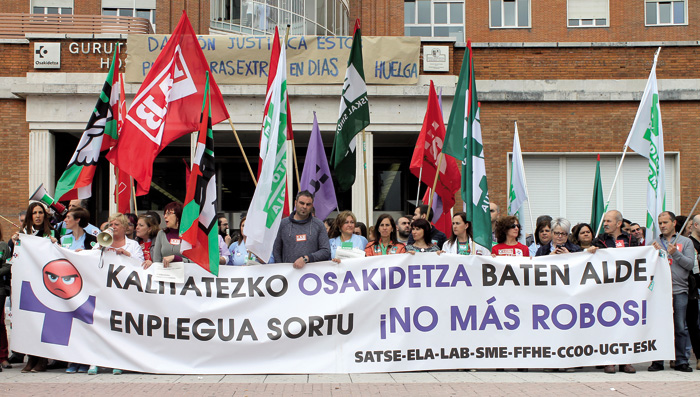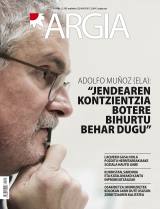Symptoms of restrictions in the health service
- Hospitals and health centres will be a refuge for all those who, at some point, suffer from an unexpected problem or, over time, need the help of the body to function properly. Concern for public health is therefore not pointless. In recent years, Osakidetza has become the protagonist of labor conflicts in the Basque Country. SATSE, ELA, LAB, SME, FFHE, CCOO, UGT and ESK have promoted a union unit to respond to the cuts made by the Basque Government and have called for mobilizations in health centres to call for the recovery of working conditions with calls for a general strike. However, the effect of the cuts goes beyond the situation of the workers and affects the whole of society, trade unions say. The quality of the public health service is at stake.

The trade unions in Osakidetza consider that the public health service in Gipuzkoa, Álava and Bizkaia has suffered a "worsening". Workers' representatives point out that waiting lists are longer, that there are fewer open beds in hospitals, and that the workload is excessive so that professionals can adequately care for patients. They hold the Basque Government responsible for the situation and accuse it of the cuts that have been made in the last six years.
In addition to the trade unions, the right to health partnership, Osalde, believes that cuts in recent years have impaired the quality of the public health service. In any case, the president of the association, Juan Luis Uria, has differentiated the “privatization models” that have developed in Spain “from the hand of the PP and CIU” from the government’s leadership. It has also clarified that the Basque Government opposed the measure applied in Spain for the repayment of health services.
However, Uria has denounced that the Urkullu Government has already pushed for "further cuts" in employment management. Particularly in “procurement policies”. In their view, these cuts have had a direct effect. Consequently, in Osakidetza there are “situations in which we have never seen ourselves”. For example, he regretted that in the emergency services you could see "people waiting in stretchers, stacked in hallways."
Trade unions say that Osakidetza's waiting lists have been lengthened, that there are fewer open beds in hospitals and that the workload of professionals is excessive to adequately care for patients.
Osakidetza's view is different. The Basque Government’s Human Resources Officer, José María Armentia, does not believe that the quality of the service has worsened. On the contrary, he argued that Osakidetza’s data reflect “an improvement in the management of the lists and in the response that has been given”. The goal is, according to Armentia, “to do more with less”.
The quality of the service concerned
It is precisely when working with less that that is one of the main obstacles for workers’ representatives to be able to offer good service. In 2013, the Basque Government decided to extend working hours to civil servants from 1,592 to 1,614.5 hours per year.
According to the report commissioned by Osakidetza to the consultant Deloitte, between 2012 and 2013 there were 1,500 job disappearances as a result of the enlargement of the day. The Basque Government has decided to return to the previous working day for 2016, but the Spanish Government has resorted to the measure and will not be able to enter into force at the moment.
In addition, there is another important factor in the destruction of jobs, according to the unions: Osakidetza makes fewer substitutions than necessary. Edurne Agirre, from the LAB syndicate, explained that “many doctors do not have replacements” and that “nursing assistants are also getting less and less”. As a result, co-workers are responsible for covering the gap and “the workload is usually too high”. “If a doctor is on leave or on vacation, his place is shared among others and the sick have to be seen in less time.”
According to ELA’s representative, Pello Igeregi, “Osakidetza has no clear criteria for substitutions and, depending on the place, spends more time without making substitutions.” In general, he performs substitutions “when there is no other option”. “For example, if there is only one doctor in a consultation, they have no choice but to replace that doctor. But on other occasions, they take the workload of what is missing between two doctors.”
Trade unions report that the overload of work directly affects the quality of the service provided by Osakidetza. According to his calculations, the lack of substitutions and the lengthening of working hours in Osakidetza have destroyed more than 3,000 jobs.
José María Armentia, for his part, acknowledged that recruitment in 2013 had dropped, but stressed that in the last two years in 2012
Juan Luis Uria, Osalde:
"Situations in Osakidetza have never been seen before as a result of the cutbacks that are taking place. In case of an emergency, people wait in stretchers, stacked in hallways.”
that "more contracts" have been made. The Osakidetza Human Resources Officer does not believe that the workload has influenced the quality of the service. “[The workers] have been asked for more effort in recent years and the answer has been very good.”
In particular, Osakidetza pointed out that the average delay for an operation is 50 days, according to data from the latest Activity Balance report it published. The Director-General of Osakidetza, Jon Etxeberria, has stressed the importance of maintaining the waiting list in this period, despite the fact that between 2014 and 2015 “the activity of interventions has increased […]
How is the waiting time measured?
Trade unions believe that Osakidetza's data "does not fit" with reality and have denounced the "lack of transparency" in the management indicators and public health services. The situation on the waiting lists has been worse than that of Osakidetza. They say that the way lists are measured misses the actual waits. In fact, the duration of waiting lists does not begin to be counted since the first medical consultation. The time limit for the list is that of an appointment with the specialist physician until the clinical trial or surgery is performed. Therefore, the time elapsed until the consultation with the medical family and the arrival to the specialist doctor is excluded from the data.
Pello Igeregi of ELA has denounced that the margin that is not counted “in many cases is usually four or five months”. Osalde President Juan Luis Uria believes that the methodology for measuring waiting lists “makes no sense” and shares the idea that “lists have increased considerably”. In addition, he has pointed out that, in some aspects, especially in traumatology, the lists may be around one year.
José María Armentia, Osakidetza-Basque Health Service:
“In recent years we have asked workers for more effort and the answer has been very good. The goal is to do more with less. I don’t think the workload has influenced the quality of the service.”
Workers' representatives have also denounced that patients go to private hospitals to streamline waiting lists. LAB member Edurne Agirre has stated that lists are lengthened "on purpose" to benefit private hospitals. “Jon Darpón [Health Advisor of the Basque Government] comes from the IMQ, who was director at the company’s three hospitals. Needless to say, revolving doors work well.” Agirre stressed that in 2013 Osakidetza paid 250 million euros to private hospitals for public health services.
Tired staff
However, the effect of the cuts is not limited to the duration of the lists, according to the unions. Pello Igeregi has denounced that hospitals open fewer beds due to lack of staff. “In some cases it’s because of a lack of vigilantes. The patient has been treated by a doctor, has decided to be admitted to the hospital and a bed is free, but there are no caregivers to take him to bed. This can also drown the emergency room.”
In holiday periods Osakidetza has closed the beds. It closed about 400 beds during last year’s Holy Week, due to “resource optimization” and 700 at Christmas. The trade unions accuse Osakidetza of not using all the beds on the usual days, as he refuses to hire a sufficient number of workers.
The Basque Government has decided to return to the working day of 35 hours by 2016, but the Spanish Government has resorted to the decision and at the moment will not be able to enter into force
Osalde has also explained that the first attention has been the one that has affected the cuts. In Uria’s words, many workers have recognized that they are “tired” because they have increased their workload and “have to take care of many patients.” In any case, Uria has pointed out that this is a primary care service in Osakidetza “which by far works better”. It is a “strategic” service, as it takes care “especially of the most vulnerable, elderly and with chronic diseases”.
Igeregi agrees with Uria and stresses that workers "always go above" their level of performance. “Recently, at Zumarraga Hospital, at 2 a.m., they finished changing the packages because there were not enough workers. In other hospitals, the blood has had to be removed in the evening, as during the day there is no time for it. This demonstrates the workload with which they work.”
Return to the 35-hour working day
All parties appreciate the decision of the Basque Government to return to the 35-hour working day and the measure – Spain
Beyond the resource, if it is established, it would have to recover 1,500 jobs. However, the unions believe that the recovery of working time will not be sufficient to meet the needs of Osakidetza. In this regard, they have claimed that more investment is needed to cope with the situation. ELA considers it necessary to create 5,000 short-term jobs to restore service quality. LAB says that by 2018 15,000 jobs should be created.
The trade unions consider it positive that the return of working time to the first, but that it will not be sufficient to meet the needs of Osakidetza
For the time being, the intention of Osakidetza is to contest the vacant places that remain vacant in order to be able to access them. José María Armentia has explained that the situation is no longer the case. “The Basque Government has already said that the deficit target had to be met and that is where we have a limit. Spain, for its part, has again set the rate for vacant seats in the CAV. This time it's 100 percent, but we have to make it clear that we can't get all the buckets out. In 2016, 100% of the people who retired or the casualties that have occurred in 2015 can be put out to tender, but nothing else.” Trade unions and Osakidetza met at the health sector table in February, March and April, but there was no consensus in the negotiations.
For trade unions, investing more in health is possible and not doing so is the result of the crisis, but of a "political decision". As Pello Igeregi explained, 4.8% of Gross Domestic Product (GDP) will be allocated to health this year, but if the European Union average (7.3%) were to be equated, an additional EUR 1.5 billion would be earmarked.
Osalde has also warned of the need for more investment. “Lately we see the authorities of the Basque Government opening hospitals and technological development machines but investments in technology have not been made,” Uria said. He has accused the Basque Government of being "more concerned about the deficit" than about "the people".
In 1813, Representative Lloret and Martí said: “The poor peasant and the simple soldier are the two classes most filled with pain and misery in the state. And it really is they who maintain the monarchy and the luxuries of the few individuals who integrate it,” and gives... [+]

























